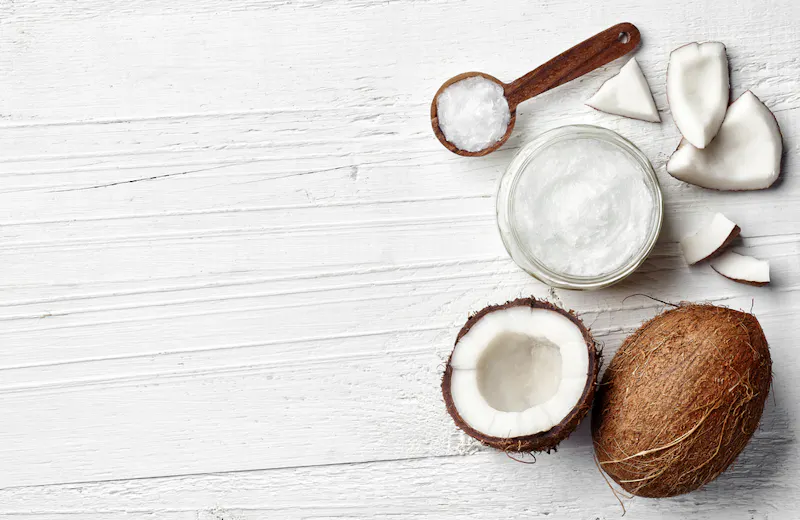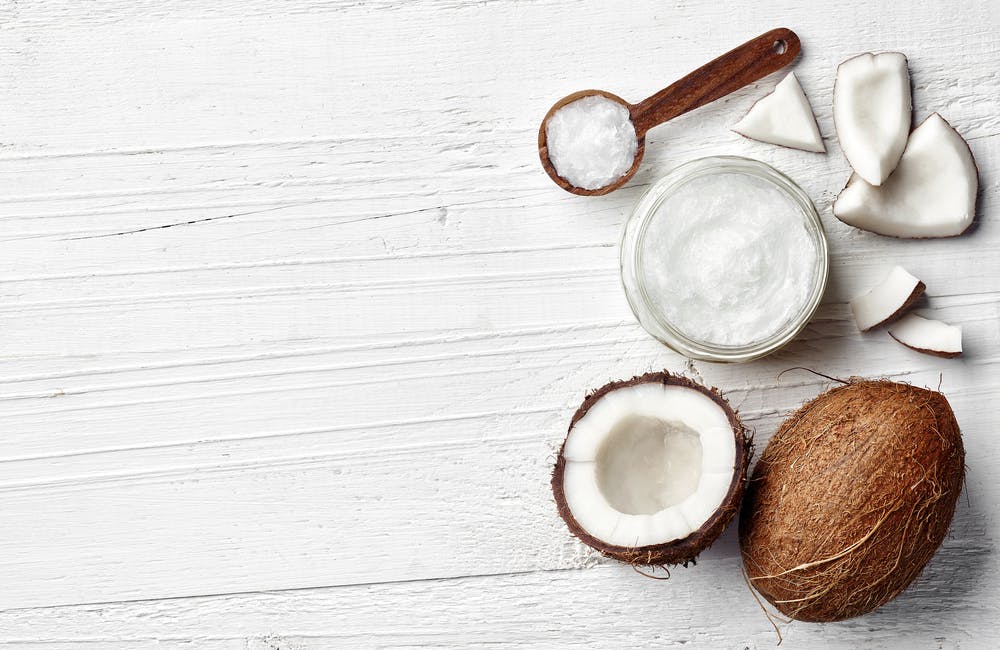All you need to know about dietary fats
What's covered?



There are four major dietary fats, all of which can be consumed as part of a balanced diet. In fact, some fat is essential for your health. But, eating too many saturated and trans fats has been linked to higher cholesterol, which might increase your risk of heart disease.
What is fat?
Fat is an essential part of your diet and is needed to carry out numerous bodily functions. For example, it’s needed for hormone production and helps you absorb nutrients.
Fats can be broken down into four main groups, which include:
- monounsaturated fats — includes omega-9 fatty acids
- polyunsaturated fats — include omega-3 and omega-6 fatty acids
- saturated fats — this also includes medium-chain triglycerides (MCTs)
- trans fats — mostly artificially created fats
Most food and oils contain both saturated and unsaturated fats, in different proportions.
Why does fat get a bad rep?
Some studies show that consuming too many saturated fats can increase your risk of heart disease. And while some recent research does seem to indicate saturated fat might not be as bad as once thought, most experts recommend eating it sparingly.
Trans fats have also been linked to increased inflammation, which in turn leads to a higher risk of heart disease and diabetes.
Lastly, fats are calorie-dense. And consuming excess calories by eating lots of fatty foods (of any kind) can lead to weight gain.
But classifying fats as ‘good’ or ‘bad’ is overly simplistic. How it affects your health is largely dependent on which fats you regularly include in your diet and how much you have.
Saturated fats
Saturated fats are solid at room temperature and are mostly found in animal products. Foods high in saturated fats include:
- fatty cuts of beef, pork, and lamb
- dairy — like whole milk, butter and cheese
- coconut and palm oils
- sugary food like chocolate, biscuits, and cake

Saturated fats are often labelled as ‘bad fats’. This comes from a series of studies that show a relationship between a high intake of saturated fats and an increase in LDL cholesterol levels — which might increase your risk of heart disease.
But no direct link between saturated fats and heart disease has been found. Keeping saturated fats low is beneficial for your health, particularly if you replace saturated fats with unsaturated fats.
In the UK, most people tend to eat too many saturated fats. Experts recommend that:
- men shouldn’t have more than 30g a day
- women shouldn’t have more than 20g a day
Reading food labels to understand the saturated fat content, opting for some meat-free meals, and replacing saturated fats with unsaturated fats (like choosing olive oil instead of butter) can help keep your intake low.
Trans fats
There are some animal products that contain traces of trans fats, but they’re mostly artificial. They’re created by adding hydrogen to vegetable oils. This process is called hydrogenation and turns the liquid oils into semi-solid fats — hydrogenated oils.
Trans fats are popular in processed and fast food because it’s cheap to produce and lasts a long time. It also gives food a desirable texture and taste.
Unfortunately, research has shown that trans fats raise your LDL cholesterol and might even suppress your HDL cholesterol (helps to remove LDL from your arteries). It’s also been linked to an increased risk of inflammation. All of these are factors that greatly impact your chances of heart disease.
Because of their negative effects on your health, several countries have banned companies from using trans fats in their products.
In the UK, there’s no official government ban. But, most of the large supermarkets and restaurant chains signed a voluntary agreement not to use artificial trans fats.
Food that might contain hydrogenated oils are:
- chips
- doughnuts
- deep-fried food
- margarine
- cakes
- cookies
- processed snack foods like crackers
Check food labels and avoid anything that has listed partially hydrogenated fat/oil or hydrogenated fat/oil as much as you can.
Monounsaturated fats
Monounsaturated fats are sometimes called omega-9 fats. These have been shown to lower your LDL cholesterol and maintain high levels of HDL cholesterol – which has a protective effect on your heart health.
Good sources of monounsaturated fats include:
- olive and rapeseed oil
- nuts — including almonds and peanuts
- avocados
Polyunsaturated fats
There are two main types of polyunsaturated fats — omega-3 and omega 6. These fats are essential for your health and you can only get them from your diet.
Omega-3 fats
Omega-3s have been linked to a host of health benefits, including reduced inflammation, a lower risk of heart disease, and even improved moods and brain function.
Omega-3s are found in a wide range of food, including:
- oily fish — like salmon, trout, and sardines
- nuts and seeds — including walnuts, flaxseed, and chia seeds
National guidelines recommend eating two portions of fish a week, one portion to be oily. If you don’t eat fish, including nuts and seeds can help. But, your body finds it harder to use this type of omega-3 (ALA). So you might need to think about taking a supplement.
Omega-6 fats
Omega-6s are found in sunflower oil, sunflower seeds, walnuts, and pumpkin seeds.
In the past, experts recommended reducing omega-6s in your diet. This is because it might contribute to inflammation in your body. But, recent research shows that it might actually help reduce your risk of heart disease. What seems to be important is replacing saturated fats with unsaturated fats like omega-6.
Most people tend to eat more omega-6s than omega-3s. This affects the balance of omega-6 to omega-3s in your body — called your omega-6 to omega-3 ratio. This should ideally be 2:1. To improve this ratio, focus on including more omegas-3s in your diet.
Medium-chain triglycerides (MCTs)
MCTs are found to naturally occur in foods like coconut oil and palm kernel oil. MCTs can be extracted from food to make MCT oil. They're less likely to be stored as fat as your body finds them easier to break down and use.
They're claimed to help with weight loss, cholesterol levels, brain function, and exercise performance. But more research is needed to understand if they're beneficial for your health.
How much fat should you eat?
Guidelines suggest that adults shouldn’t have more than 70g of fat a day, with no more than 20g being saturated fat. For a typical adult, 70g makes up about 35% of your total energy intake.
Reading labels and following the traffic light labelling system for fats (red means it’s high in fat or saturated fats) are helpful ways to understand your intake.
Clarke, R., Frost, C., Collins, R., Appleby, P., & Peto, R. (1997). Dietary lipids and blood cholesterol: quantitative meta-analysis of metabolic ward studies. Bmj, 314(7074), 112.
Connor, W. E. (2000). Importance of n− 3 fatty acids in health and disease. The American journal of clinical nutrition, 71(1), 171S-175S.
Food Standards Agency. (2006). FSA nutrient and food based guidelines for UK institutions.
Ginsberg, H. N., Barr, S. L., Gilbert, A., Karmally, W., Deckelbaum, R., Kaplan, K., ... & Dell, R. B. (1990). Reduction of plasma cholesterol levels in normal men on an American Heart Association Step 1 diet or a Step 1 diet with added monounsaturated fat. New England Journal of Medicine, 322(9), 574-579.
Grundy, S. M. (1986). Comparison of monounsaturated fatty acids and carbohydrates for lowering plasma cholesterol. New England Journal of Medicine, 314(12), 745-748.
Hooper, L., Martin, N., Abdelhamid, A., & Smith, G. D. (2015). Reduction in saturated fat intake for cardiovascular disease. Cochrane database of systematic reviews, (6).
Katan, M. B., Grundy, S. M., & Willett, W. C. (1997). Should a low-fat, high-carbohydrate diet be recommended for everyone? Beyond low-fat diets. The New England journal of medicine, 337(8), 563.
Kromhout, D., Menotti, A., Bloemberg, B., Aravanis, C., Blackburn, H., Buzina, R., ... & Karvonen, M. (1995). Dietary saturated and transfatty acids and cholesterol and 25-year mortality from coronary heart disease: the seven countries study. Preventive medicine, 24(3), 308-315.
Kris-Etherton, P. M., Pearson, T. A., Wan, Y., Hargrove, R. L., Moriarty, K., Fishell, V., & Etherton, T. D. (1999). High–monounsaturated fatty acid diets lower both plasma cholesterol and triacylglycerol concentrations. The American journal of clinical nutrition, 70(6), 1009-1015.
Lavie, C. J., Milani, R. V., Mehra, M. R., & Ventura, H. O. (2009). Omega-3 polyunsaturated fatty acids and cardiovascular diseases. Journal of the American College of Cardiology, 54(7), 585-594.
National Health Service (2020). Eat well. Fat: the facts. Retrieved 3 July 2020 from https://www.nhs.uk/live-well/eat-well/different-fats-nutrition/
Ruxton, C. H. S., Reed, S. C., Simpson, M. J. A., & Millington, K. J. (2004). The health benefits of omega‐3 polyunsaturated fatty acids: a review of the evidence. Journal of human nutrition and dietetics, 17(5), 449-459.
Simopoulos, A. P. (1991). Omega-3 fatty acids in health and disease and in growth and development. The American journal of clinical nutrition, 54(3), 438-463.
Simopoulos, A. P. (2002). The importance of the ratio of omega-6/omega-3 essential fatty acids. Biomedicine & pharmacotherapy, 56(8), 365-379.
Swanson, D., Block, R., & Mousa, S. A. (2012). Omega-3 fatty acids EPA and DHA: health benefits throughout life. Advances in nutrition, 3(1), 1-7.
Virtanen, J. K., Mursu, J., Voutilainen, S., & Tuomainen, T. P. (2018). The associations of serum n-6 polyunsaturated fatty acids with serum C-reactive protein in men: the Kuopio Ischaemic Heart Disease Risk Factor Study. European journal of clinical nutrition, 72(3), 342-348.